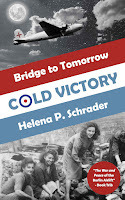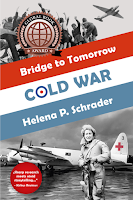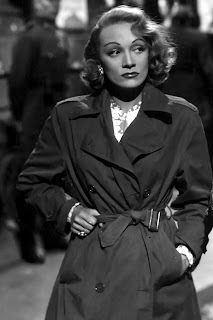Characters of "Cold Victory" : Alexandra "Alix" von Feldburg
Alexandra "Alix" Baroness von Feldburg is the daughter of a German diplomat and the widow of a leading member of the German Resistance to Hitler. Readers of my novel about the German Resistance, Traitors for the Sake of Humanity, will recognize her. She returns in "Cold Victory" in her capacity as a lawyer, who has made her reputation assisting the prosecution at Nuremberg.
In this excerpt, she arrives in Berlin for the first time since the war and is confronted with her memories.
Alix had lived through BomberHarris’ ‘Battle of Berlin’ — on the ground. For the second half of 1944, whenshe was on the run from the Gestapo after the failed coup attempt of 20 July,she had spent much of her time hiding in closets and behind false walls,cowering in cupboards and lying under beds sometimes for hours. She was wantedfor treason and had been given refuge by courageous men and women who allowedher to hide in their apartments, sometimes for only a few days, sometimes for acouple of weeks. Yet she had to keep moving, and without being registered atany residence, she could not appear in the air raid shelter without arousingsuspicion. Staying above ground during air raids, on the other hand, became sodangerous that she decided to leave Berlin. She went first to a pig farm nearDessau, where she had disguised herself as a slave labourer for almost fourmonths. From there, she made her way to Braunschweig where she had been able toturn herself over to American troops in the closing days of the war.
Her last memories of Berlin wereof a city in flames. She had intentionally planned her escape from the cityduring an air raid because the raid disrupted normal traffic patterns anddistracted the attention of the authorities. She had hidden herself aboard asupply train bound for the Western Front. The Allies targeted railheads, andthe Reichsbahn did not want their precious cargo of munitions to befound by the RAF bombers. So, the train had crawled out of the city at a paceintended to be too slow for detection from the air. That had enabled her toclimb aboard unseen — and prolonged the agony of uncertainty as the bombsrained down.
Yet for all the destruction shehad witnessed on the ground, she was not prepared for the carpet of destructionspread out before her as they flew toward the city centre. Before they hadreached the worst-hit areas, however, they banked to the right and started tofollow the Havel. David shouted above the engines that it was time for her toreturn to her seat and put her seatbelt on. Alix obeyed in a daze. She'd underestimated how traumatic a return toBerlin would be.
Now she found herself wondering ifshe could cope. She had told Christian from the start that she would not setfoot in the apartment house where she had lived with Philip and where he hadkilled himself. Christian had arranged for her to live somewhere else. But ifshe was in Berlin, didn’t she have an obligation to find out what had happenedto her parent’s home? Both her parents were dead; her mother had died of heartfailure while working in a munitions factory early in 1945, and her father hadbeen shot for desertion during the assault on Berlin. However, her sister Gretewas living with relatives in Marburg and her brother Rudi had returned fromSoviet imprisonment without his legs; he was in a rehabilitation centre nearKassel. They might want to live in the family home in the future or they mightwant to sell or rent it — if it was still standing. To find out if it hadsurvived, she would have to visit her childhood neighbourhood and face thememories….
And then there was theBendlerblock where she had worked so many long, hard and yet rewarding hours.There she had met and forged friendships with the most determined andunwavering opponents of Hitler’s criminal regime — Generaloberst Beck,General Olbricht, General von Treschow — and Philip. Someone said there was asmall memorial in the courtyard, marking where Olbricht, Stauffenberg and theothers had been executed. She felt she ought to lay a wreath or at least a roseon that spot — yet dreaded the thought of treading the cobbles where suchhonourable men had been shot without trial. How could she stand where theirblood had flowed, cooled and then been scrubbed away by some indignant andardent supporter of Hitler?
Or what if she had business withsubsidiary organs of the Allied Control Council and had to visit the buildingwhere the so-called “People’s Court” had held kangaroo trials of those involvedin the coup attempt? Where Roland Freisler and his fellow Nationalist Socialist‘judges’ and lawyers had taunted, ridiculed and condemned her beloved UncleErich and so many others because they wanted to restore the rule of law andprotect human dignity and rights?
As the tyres squealed under herfeet at landing, Alix had a moment of panic. She didn’t want to be here!
Find out more about the Bridge to Tomorrow series, the awards it has won, and read reviews at: https://helenapschrader.net/bridge-to-tomorrow/







